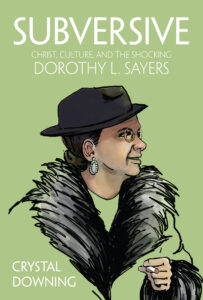 Summary: An exploration of the thought of Dorothy Sayers.
Summary: An exploration of the thought of Dorothy Sayers.
I picked up Subversive because it was free to me as part of the Audible Plus Catalogue (books that Audible subscribers can borrow without additional cost other than the membership.) I have been slowly working through a couple of books by Sayers a year over the past decade. I have finished all of her Wimsey full novels, and both read and listened to her play cycle, A Man Born to be King. I also read a book about Sayers and CS Lewis’ friendship and the lost novel that Jill Patton Walsh finished. I was not new to Dorothy Sayers, but I am also not a scholar of Sayers, so I am a bit wary of being annoyed by this book but without enough academic background to defend my annoyance well.
I think part of the problem is that I came in with inappropriate expectations. I was expecting an exploration of Sayers’ ideas but more biography. Subversive is not a biography; it is closer, instead, an attempt to introduce modern readers to Sayers, someone who is fairly unknown but who has exerted much influence. Because I was expecting more biographical details, I am sure my unmet expectations played a role in being annoyed by Subversive.
I kept reading because I learned a lot and wanted to know more about Sayers. Downing introduced me to aspects of Sayers I did not know, and while I thought about putting it down several times, it was short enough and helpful enough to keep listening.
My main complaint is that it felt like Downing was appropriating Sayers. Given Downings’ main point, that Sayers was subversively pushing mid-century British Christians to think more clearly about culture and their Christianity and underlying intellectual biases, it feels like I am likely wrong in that perception. But I have come to distrust authors who do not push back against their subject in at least some fashion. This is an uncharitable comparison, but I can’t think of a better one. After all of the hype around it, I picked up Eric Metaxas’ biography of Wilberforce and hated it. Metaxas was not telling the reader about Wilberforce as much as he was transforming Wilberforce for his own purposes. And then, when Metaxas’ biography of Bonhoeffer came out, I may have skipped it, but I was offered a free copy for review, and it had a glowing introduction by Tim Keller. But as is well detailed in The Battle for Bonhoeffer and, to some extent, the Biography of Letters and Papers from Prison, Metaxas did not so much write a biography but a hagiography that appropriated aspects of Bonhoeffer while distorting his actual ideas.
I know enough about Sayers to know that her ideas do not fit nicely in our modern world. Some described her as a proto-feminist, but she also opposed the feminism of her day. She modernized the language of Jesus in her plays about Jesus and opposed using King James English, but she was also very conservative in their approach to orthodoxy. As Downing says, she conceived a baby when she was in her 30s in part because she did not believe that contraception was moral, but her sexual partner didn’t believe sex without contraception was licit for them, and he abandoned her because of the baby. While she arranged for him to be raised in an orphanage run by her sister and attempted to adopt him, she did not even disclose his existence to her own parents (or him). She is credited for the rise of the classical school movement, but she opposed the type of nationalism that is increasingly associated with that classical school movement. I know enough about Sayers to know that virtually no modern reader would be comfortable with the range of her opinions, but that range seemed to be missing from the book. Sayers’ ideas, as presented here, did not have any of the rough edges that I think are there, and in many ways, this lack of rough edges undercut the idea that Sayers was subversive.
There was also a lot of repetition and repeated themes that got boring. Downing was interested in showing how Sayers believed in “both/and” not just either/or. But there is only so much repetition of that idea before it feels contrived. That is even more the case for her presentation of the “economy of exchange.” I can see how Sayers was concerned about how Christians attempt to negotiate with God and seek to follow God to acquire what they want from God. This is, in some ways, a prosperity gospel concept. And there is certainly a misuse of the idea of following God because of what good can come about because of it. But again, the sheer number of times it comes up makes me question whether ideas are being shoehorned into the book. (I searched using Google Books’s search inside feature, and it says the phrase “economy of exchange” was used 46 times in the 142 pages available to be searched.)
I am still interested in reading more Sayers. I plan to read Mind of the Maker, the Zeal for thy House (play), and A Presumption of Death (the next Jill Patton Walsh book continuing the Wimsey series) by the end of the year.
Subversive: Christ, Culture, and the Shocking Dorothy L. Sayers by Crystal Downing Purchase Links: Hardcover Kindle Edition, Audible.com Audiobook